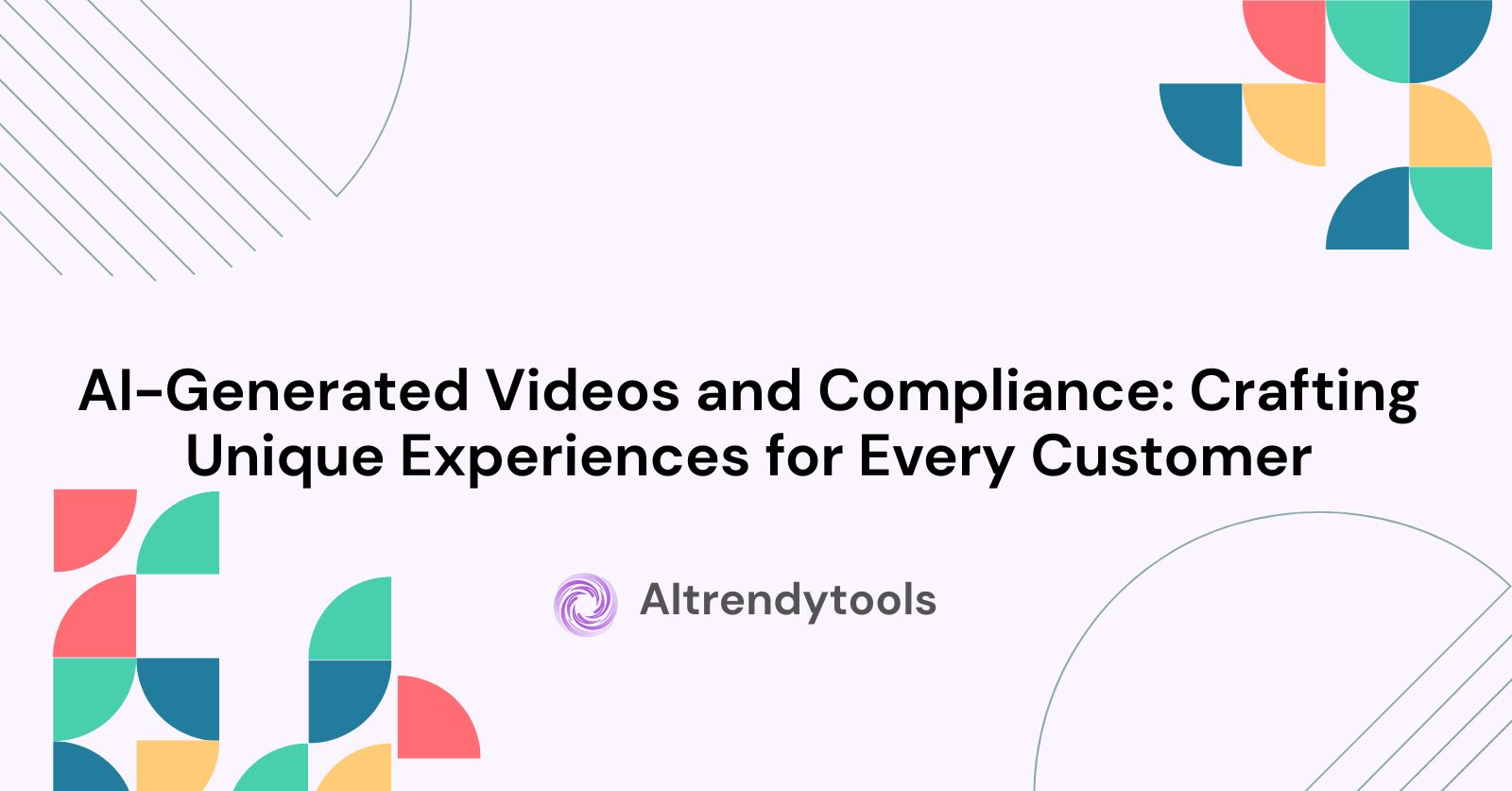🔥 AITrendytools: The Fastest-Growing AI Platform |
Write for usAI-Generated Videos and Compliance: Crafting Unique Experiences for Every Customer
Discover how to create AI-generated videos that are both personalized and compliant. Learn best practices for privacy, ethics, and building trust through responsible video content.
Aug 19, 2025
Personalization is on the uprise, and it can’t be considered an afterthought anymore; it’s an expectation. AI-generated videos have emerged as a powerful way for brands to deliver excellent experiences that truly resonate with each customer.
As exciting as technology becomes, it also comes with responsibility, which means remaining compliant with data privacy laws, copyright regulations, and ethical standards.
In this article, we’ll dive deeper into exploring how businesses can balance the creative freedom of AI with the need for compliance so they can create unique and engaging videos that don’t just surprise customers but also build trust.
The power of personalization
71% of customers now expect companies to deliver personalized interactions. AI is taking personalization to the next level. AI helps create experiences that feel genuinely personal. This level of relevance not only captures the attention of people but also builds stronger relationships and trust with customers.
AI-generated videos offer personalized experiences by using data-driven insights to tailor content for each viewer, automatically and at scale, and here’s how it works:
- Data Input: AI tools can pull from customer data, such as names, locations, purchase history, behavior, or preferences, all collected through CRM systems, websites, or apps.
- Dynamic templates: Instead of creating new videos from scratch for each person, AI uses customizable video templates.
- Real-time rendering: AI then generates the final video, swapping in unique content for each user. This could include personalized voiceovers, captions, images, or even facial avatars speaking directly to the viewer.
Let’s not forget that what once required hours of manual editing can now be done in only a few minutes.
Compliance isn’t an afterthought
When it comes to AI-generated videos, compliance can’t be treated as an afterthought since they rely on personal data and synthetic media. As exciting as these technologies are, they also introduce real risks.
Misusing customer data, overlooking consent, and even violating copyright laws can quickly lead to legal trouble, damaged trust, and reputational harm. In regions governed by strict regulations like the GDPR or CCPA, even if you refuse to comply with privacy laws a little, it can lead to long-term consequences.
Above all, customers are becoming aware of how their data is being used. If they feel privacy has been compromised or misrepresented, they’re more likely to disengage or, worse, speak out. Brands that incorporate privacy into their processes show that they respect their audience and value transparency.
If you’re looking to experiment with AI-generated video content while staying within compliance boundaries, it’s essential to choose tools that respect data privacy and offer transparent usage policies. That’s why we’ve put together a list of the best free AI video generators, including:
- Freepik AI Video Generator
- Synthesia
- Google Veo 2
- Hailuo
- Alibaba Qwen
- Kling
- Runway
- LTX Studio
- Adobe Firefly
- OpenAI Sora
- Envato VideoGen
Creating a privacy-first AI video strategy
As AI-generated videos become more common in educating customers, marketing and customer engagement, putting privacy at the core of your strategy isn’t just smart, it’s a must. A privacy-first approach means designing every stage of your video workflow with user protection, transparency, and compliance in mind.
Start by collecting only the data you truly need, and make sure you have clear, informed consent from users. Be upfront about how their data will be used, especially if you’re incorporating personalized content or synthetic media like avatars or AI voiceovers.
By integrating privacy protections from the beginning, not considering them as an afterthought, you not only reduce risk but also build trust with your audience.
Cross-website tracking
To create highly personalized AI-generated videos, brands often rely on user data collected through cross-website tracking. This method enables marketers to track a user’s behavior across multiple sites, creating a more comprehensive picture of their preferences, habits, and interests.
While this data is incredibly valuable for crafting targeted, engaging video content, it also raises serious privacy concerns. Many privacy regulations, like GDPR and CCPA, require clear user consent for any cross-site tracking, and failing to obtain it can result in legal penalties.
That’s where consent management platforms like Usercentrics come in. They make it easier to gather, manage, and document user consent in a compliant way, so brands can still leverage valuable data without crossing legal lines.
Ethical considerations and deepfake risks
As AI-generated videos grow more advanced, so do the ethical challenges, especially when it comes to synthetic media and deepfakes. While personalized avatars and voice cloning can improve the customer experience, they can also blur the line between creativity and deception if they aren’t used responsibly.
One major risk is the unintentional misuse of someone’s likeness or voice without proper consent. Even if it’s technically possible, recreating a real person in a video, especially a public figure or employee, requires careful ethical review and often legal clearance.
Deepfake technology, in particular, can easily be exploited to spread misinformation or manipulate viewers, which can destroy trust and trigger serious reputational damage.
The key here is transparency, so it’s important to disclose AI or synthetic media when used in your videos, and avoid any content that could mislead or misrepresent.
Prioritizing ethics and consent in your AI video strategy not only helps you stay compliant but also shows your audience that you are focused on innovation. Leveraging a white label OTT platform can further support this approach by providing secure, brand-controlled channels to distribute AI-generated videos while maintaining full oversight of content and compliance practices.
Implementing AI video responsibly in your workflow
Using AI-generated videos in your business strategy is smart, but it’s important to approach it with responsibility. Here are some general tips on how you can do so:
- Set clear goals: Ask yourself, “What do I want this video to achieve? Is it improving customer onboarding or personalizing a sales pitch? Or something else?
- Use data respectfully: AI thrives on data, but that doesn’t mean you need to collect everything. Stick to relevant information, get proper consent, and be transparent about how that data will be used.
- Choose the right tools: Choose platforms that are upfront about their data policies, offer built-in compliance features, and don’t cut corners when it comes to privacy and security.
Even if AI is doing all the work, your message still needs to feel personal. Avoid anything that sounds misleading or robotic.
Build customer trust through communication
At the heart of every successful AI-powered campaign is one thing: Trust. When you’re using AI-generated videos, especially personalized ones, your customers deserve to know how and why their data is being used.
Start by being transparent. Let viewers know if the video they’re watching was created using AI or includes synthetic elements like voiceovers and avatars. If you’re using personal data to tailor messages, explain what information you collected and how it helped shape their experience. Simple, human language goes a long way; no one likes jargon or vague legal talk. "When people know what’s real and why it matters, they’re more likely to trust the message,” says Alex Vasylenko, Founder of Digital Business Card.
It’s also important to give people control. Allow them to opt out, update their preferences, or ask questions. Being open shows that you respect their choices and are committed to ethical, privacy-first practices. Integrating these practices into your overall customer engagement strategy ensures that interactions are meaningful, transparent, and loyalty-driven.
In a digital world filled with noise, clear communication isn’t just nice, but it’s what builds long-term loyalty. When customers feel informed and respected, they’re more likely to trust your brand and stick around.
A few future trends shaping AI-generated videos
Something we can’t deny is that AI-generated videos are evolving fast, and the future looks both exciting and complex. As technology matters, several key trends are already starting to shape how businesses create, personalize, and deliver content.
- Real-time personalization: AI is moving toward real-time video generation based on live customer behavior. Soon, brands will be able to instantly tailor video messages based on the user's latest interaction, preferences, or location.
- Voice and avatar cloning: Expect more advanced AI avatars and voice models. This will open new doors for scalable video communication, but will also raise important ethical and compliance questions.
- Stronger regulations: As synthetic media grows, so will the push for stricter privacy and deepfake laws. Brands that stay ahead of the curve on compliance have a significant advantage.
- Integration with other AI tools: AI video will increasingly plug into CRM systems, chatbots, and email platforms, creating intelligent customer journeys across channels.
AI-generated videos are the new era of personalized content
AI-generated videos are unlocking a new era of personalized, scalable content, but with that power comes responsibility. As businesses embrace this technology to connect with customers in more meaningful ways, compliance and ethical practices can’t be an afterthought.
When this is done right, AI video isn’t just smart marketing, but it’s a way to build trust, loyalty, and lasting relationships. By putting human connection and transparency above everything else, you can deliver experiences that not only impress your audience, but also respect their rights.
🚀 Submit Your Tool to Our Comprehensive AI Tools Directory
Get your AI tool featured on our complete directory at AITrendytools and reach thousands of potential users. Select the plan that best fits your needs.





Join 30,000+ Co-Founders
Related Blogs
ClassPoint Review: Best Interactive Teaching Tool
ClassPoint transforms PowerPoint into an interactive classroom. Compare features, pricing & alternatives in this complete teacher's guide
Maharashtra Times: Maharashtra's #1 Marathi Newspaper
Maharashtra Times (मटा) is Maharashtra's #1 Marathi newspaper since 1962. Read today's ePaper, download the free app & get live news from Mumbai, Pune & beyond.
MovieSwap: The Bold Idea to Free Every Movie Ever Made
MovieSwap wanted to let you stream any movie ever made legally. Discover why this bold Kickstarter idea failed and what it means for film fans today.
Submit Your Tool to Our Comprehensive AI Tools Directory
List your AI tool on AItrendytools and reach a growing audience of AI users and founders. Boost visibility and showcase your innovation in a curated directory of 30,000+ AI apps.





Join 30,000+ Co-Founders

